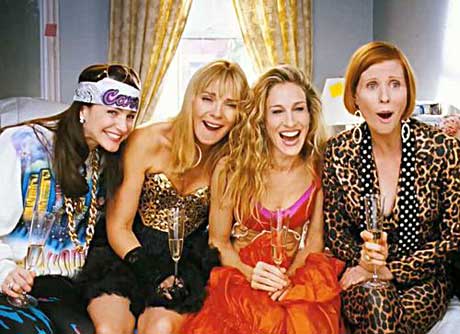Like the series its based on, Sex and the City: The Movie is at times very funny, genuinely moving and even occasionally shines light on often-ignored themes like the fear of aging, the complications of monogamy and the dark side of human emotion. But this praise is hard to stand by when its situated next to the thesis-worth of issues that seem to have grown significantly in Sexs journey between formats. Tawdry dialogue abounds, especially in Carrie Bradshaws reading of some parts of her books, which shes now making a very good living writing. Her insight into love sounds like it comes from a high school writing workshop. Whats worse is sometimes so does writer/director Michael Patrick Kings. He couldnt manage to come up with anything new here, with the plot of the film a basic rehash of the final season of the show. Breaking up Carrie and Miranda from Big and Steve (which weve already seen at least three times) just to give the plot something to work with is as desperate as all those girls wearing evening gowns to the screenings. The DVD set of the film, with 24 unnecessary minutes added to the cut, simply illuminates the problems. Watching Carrie shriek at the sight of designer gowns, fancy bags and, of course, shoes remarkably exposes the materialistic and shallow themes Sex and the City is often rooted in. Carrie is even better off this time around (thanks to her books or thanks to her "Big sugar daddy?) and this brings the film to a whole new level of depicting social hierarchies. This is most offensively displayed in Carries "Driving Miss Bradshaw relationship with her assistant, Jennifer Hudsons "we have a black character! Louise. Louise is at Carries beck and call, running her errands and returning her emails. She cant even buy a fancy bag she "rents them and freaks out like a starved child when Carrie rich white woman that she is buys her a Louis Vutton bag for all her hard work she did making sure rich, white Carrie has an organized apartment and returned emails. Beyond the extended scenes, the sets extras, despite a whole disc to hold them, are pretty weak. There are slight featurettes on the films fashion and theme song singer Fergies "musical journey, and a we-had-to-do-this conversation between King and Sarah Jessica Parker. The set will probably find a place among the legion of Sex fans, which is probably whats most disappointing about the film. Mammoth, estrogen-fuelled following that it has, the film failed because it didnt take a very rare opportunity to be a little more critical of the world it examines and influences.
(Alliance)Sex And The City: The Movie
Michael Patrick King

BY Peter KnegtPublished Sep 26, 2008